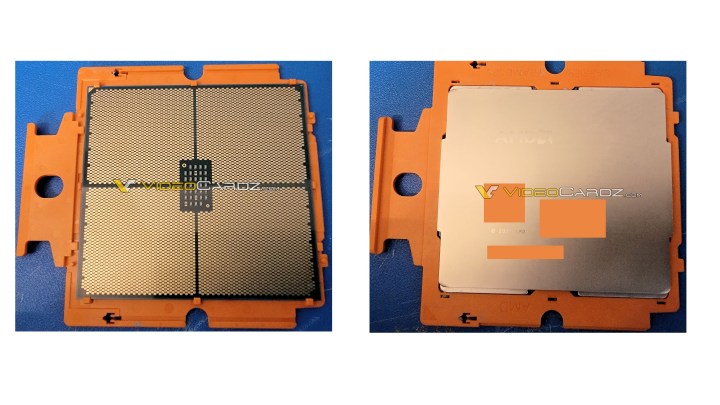AMD has a new line of EPYC processors in the works. Based on the Zen 4 architecture, the upcoming Genoa server CPUs will support up to 96 cores and require massive amounts of power.
Following a leaked photo from last week, we now have more information about the new Genoa CPUs, including additional photos and an X-ray of the chip.

The new photos of the chip have been released by VideoCardz. Aside from two photos of what is likely a working prototype of the new AMD EPYC Zen 4 Genoa CPU, we also have an X-ray and AMD’s official render to go by. AMD showed off the general structure of its new 5nm accelerated data center chip during its CES 2022 keynote. The X-rayed image of the processor is consistent with the render presented by AMD.
AMD’s upcoming server processor marks a switch from Zen 3 to Zen 4 architecture and brings with it a brand-new socket. AMD actually has two EPYC processors planned for this year: One codenamed Genoa, pictured above, and one dubbed Bergamo. Both Genoa and Bergamo are rumored to use the same new SP5 (LGA-6096) socket.
As for the pictured Zen 4 Genoa CPU, this sample is not the most powerful option that the lineup will offer. The processor has 16 cores and a boost clock of 3.7GHz. It has a quite hefty 195W TDP, although that is nothing compared to the top Genoa CPUs that may have a TDP of up to 400W.
The fact that the sampled CPU offers 16 cores is proven by looking underneath the large heat spreader. As the processor features only two charge-coupled devices (CCDs) out of a maximum of twelve, it means that each CCD offers 8 cores. The Genoa processors can support up to 96 cores with twelve CCDs.

The rear of the processor features four groups, each with around 1,520 pins. Compared to the current generation of EPYC processors (which are based on the SP3 socket,) the new SP5 platform offers 2,002 more pads. AMD had to increase the number of connectors in order to support DDR5 memory and PCIe Gen 5.0, both of which require more bandwidth than the previous generations.
It’s going to be a busy year for AMD. The company has confirmed that AMD EPYC Zen 4 Genoa is on track to be released this year, followed by Bergamo. Sometime in 2023 or 2024, AMD is planning to release the next iteration of its EPYC lineup, code-named 7005 “Turin.” The rumored Turin CPUs are also said to use the same SP5 socket as the chips AMD is releasing later this year.



